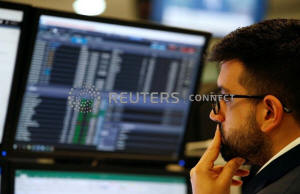|
U.S. sanctions on Huawei send stocks
reeling; yields fall
 Send a link to a friend
Send a link to a friend
 [May 16, 2019]
By Saikat Chatterjee [May 16, 2019]
By Saikat Chatterjee
LONDON (Reuters) - European stocks fell,
government bond yields slipped and the Japanese yen firmed on Thursday
after the U.S. government hit Chinese telecoms giant Huawei with severe
sanctions, further straining Sino-U.S. trade ties.
An index of European shares fell as much as 0.5% in early European
trading with the German stock index down 0.4%. U.S. stock futures were
down 0.4%, pointing to a weak start on Wall Street.
The broad weakness in European markets was somewhat offset by small
gains in Chinese and Hong Kong stock indexes leading to only marginal
losses on a global stock index as investors expected state authorities
to step in to support the market and stabilize sentiment.
"Chinese stocks are up as markets expect authorities to intervene to
support sentiment but this kind of activity is not sustainable and
unless we see a clear resolution in the China-U.S. trade conflict,
overall sentiment will remain weak," said Neil Mellor, a senior FX
strategist at BNY Mellon in London.
While benchmark indexes in China and Hong Kong were up between 0.3-0.8%
at the close of trading, bond markets were signalling more pain for risk
appetite.

Core German government bond yields were flirting with their lowest level
in nearly three years while Dutch bond yields were about to dip into
negative territory, a phenomenon not seen since October 2016.
Late on Wednesday, the U.S. Commerce Department said it was adding
Huawei Technologies Co Ltd and 70 affiliates to its "Entity List" - a
move that bans the company from acquiring components and technology from
U.S. firms without government approval.
The move took global markets by surprise as sentiment had steadied
somewhat in the previous session on news that U.S. President Donald
Trump was planning to delay tariffs on auto imports after a swathe of
weak U.S. and Chinese economic data.
RATE CUT BETS GROW
As trade tensions have made a reappearance on investors' radars, weak
U.S. data has also ratcheted up market expectations of a U.S. interest
rate cut in the coming months.
[to top of second column]
|

A trader works at his desk whilst screens show market data at CMC
Markets in London, Britain, January 16, 2019. REUTERS/John Sibley

In the United States, retail sales unexpectedly fell in April as
households cut back on purchases of motor vehicles and a range of
other goods, while industrial production fell 0.5% in April, the
third drop this year.
Yields on 10-year U.S. Treasury bonds eased to 2.366%, near a
15-month low of 2.340% touched on March 28.
Fed funds rate futures are fully pricing in a rate cut by the end of
this year and more than a 50% chance of a move by September.
"The markets are inching step by step in pricing in a rate cut. That
is a sea change from a year ago when the consensus was three to four
rate hikes a year," said Akira Takei, bond fund manager at Asset
Management One.
Falling U.S. yields have eroded support for the greenback with the
dollar down 0.1 percent against a basket of its rivals.
Oil prices gained on the prospect of mounting tensions in the Middle
East hitting global supplies despite an unexpected build in U.S.
crude inventories.
Brent crude rose 0.3% to $71.99 a barrel, while U.S. West Texas
Intermediate (WTI) crude fetched $62.26, also half a percent higher.
Gold edged up to $1,296.9 per ounce.
For Reuters Live Markets blog on European and UK stock markets,
please click on: [LIVE/]
(Reporting by Saikat Chatterjee; Additional reporting by Hideyuki
Sano and Daniel Leussink in TOKYO; Editing by Andrew Cawthorne)
[© 2019 Thomson Reuters. All rights
reserved.]
Copyright 2019 Reuters. All rights reserved. This material may not be published,
broadcast, rewritten or redistributed.
Thompson Reuters is solely responsible for this content.
 |